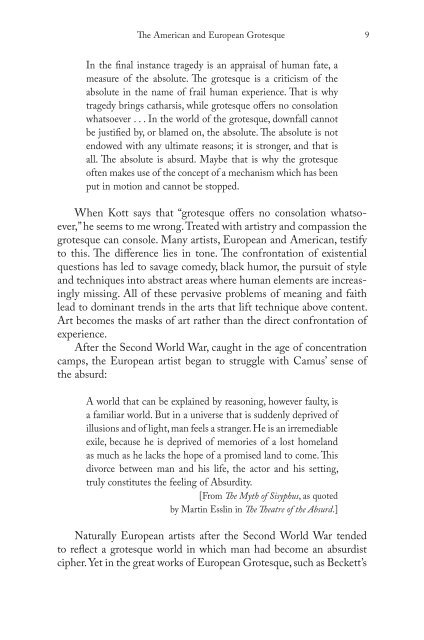- Page 3: Bloom’s Literary ThemesThe grotes
- Page 8: ContentsixThe Metamorphosis (Franz
- Page 12: Series Introduction by Harold Bloom
- Page 15 and 16: xviVolume Introduction by Harold Bl
- Page 17 and 18: xviiiVolume Introduction by Harold
- Page 19 and 20: The American and European Grotesque
- Page 21 and 22: The American and European Grotesque
- Page 23 and 24: The American and European Grotesque
- Page 28: The American and European Grotesque
- Page 31 and 32: 14William Faulknerand uncertainty o
- Page 33 and 34: 16William Faulknerfor “sitting th
- Page 35 and 36: 18William FaulknerCash plugs the ho
- Page 37 and 38: 20William FaulknerMost importantly,
- Page 39 and 40: 22William Faulkneras honoring the d
- Page 42 and 43: The Bacchae25see what is happening.
- Page 44 and 45: The Bacchae27shown the unleashing o
- Page 46 and 47: The Bacchae29torn apart by the wome
- Page 48 and 49: The Bacchae31this captured lion’s
- Page 50 and 51: The Birds(Aristophanes),.“Empire
- Page 52 and 53: The Birds35Euelpides requests a cit
- Page 54 and 55: The Birds37Zeus himself, and born a
- Page 56 and 57: The Birds39Pisthetaerus’ sacrific
- Page 58 and 59: Candide(Voltaire),.“Optimism”by
- Page 60 and 61: Candide43ourselves, having read bot
- Page 62 and 63: Candide45size at all; it is situate
- Page 64: Candide47who embrace it. The questi
- Page 67 and 68: 50Miguel de Cervantesblooming Sprin
- Page 69 and 70: 52Miguel de Cervanteswill I retract
- Page 71 and 72: 54Miguel de Cervanteshimself as in
- Page 73 and 74: 56Miguel de CervantesHowever, neith
- Page 75 and 76:
58Edgar Allan PoeEdgar Allan Poe fo
- Page 77 and 78:
60Edgar Allan Poeindicate with suff
- Page 79 and 80:
62Edgar Allan Poecriminal minister
- Page 82 and 83:
Frankenstein(Mary Shelley),.“Elem
- Page 84 and 85:
Frankenstein67his eyes; behold the
- Page 86 and 87:
Frankenstein69the combination of be
- Page 88 and 89:
Frankenstein71the possibility that
- Page 90 and 91:
Frankenstein73killing the child he
- Page 92 and 93:
“Good Country People”(Flannery
- Page 94 and 95:
Good Country People77[O’Connor’
- Page 96 and 97:
Good Country People79be to make the
- Page 98 and 99:
Good Country People81matter) makes
- Page 100 and 101:
Good Country People83emphasis on gr
- Page 102:
Good Country People85Kayser, Wolfga
- Page 105 and 106:
88Jonathan SwiftA critic who seeks
- Page 107 and 108:
90Jonathan Swiftthe impunity of cer
- Page 109 and 110:
92Jonathan Swiftballads against him
- Page 111 and 112:
94Jonathan Swiftmankind: it is you
- Page 113 and 114:
96Jonathan Swift25. Ibid. iii. 277.
- Page 115 and 116:
98William Shakespearewider slice of
- Page 117 and 118:
100William ShakespeareAs suggested
- Page 119 and 120:
102William ShakespeareBy those Wels
- Page 121 and 122:
104William ShakespeareHotspur. Harr
- Page 123 and 124:
106William ShakespeareAnd, as epigr
- Page 126 and 127:
Inferno(Dante Alighieri),.“Grotes
- Page 128 and 129:
Inferno111of the workman to the mos
- Page 130:
Inferno113upon it in cross ripples,
- Page 133 and 134:
116William Shakespeareand the ridic
- Page 135 and 136:
118William Shakespeareit were, inco
- Page 137 and 138:
120William Shakespeareabsurdity of
- Page 139 and 140:
122William ShakespeareBut there is
- Page 141 and 142:
124William Shakespearein’. Again
- Page 143 and 144:
126William Shakespeareeyes is a thi
- Page 145 and 146:
128William ShakespeareGloucester ha
- Page 147 and 148:
130William ShakespeareGloucester: t
- Page 149 and 150:
132William Shakespeareto the poet
- Page 152 and 153:
The Metamorphosis(Franz Kafka),.“
- Page 154 and 155:
The Metamorphosis137are undercut an
- Page 156 and 157:
The Metamorphosis139grotesque writi
- Page 158 and 159:
The Metamorphosis141and so his deat
- Page 160:
The Metamorphosis143written. Among
- Page 163 and 164:
146Nathanael Westgrotesque world: o
- Page 165 and 166:
148Nathanael Westbirth take place
- Page 167 and 168:
150Nathanael Westapproaching the co
- Page 169 and 170:
152Nathanael Westas his attendants.
- Page 172 and 173:
The Mysterious Stranger(Mark Twain)
- Page 174 and 175:
The Mysterious Stranger157their pla
- Page 176 and 177:
The Mysterious Stranger159as a sure
- Page 178 and 179:
The Mysterious Stranger161recalls:
- Page 180 and 181:
The Mysterious Stranger163outside,
- Page 182:
The Mysterious Stranger165Satan spe
- Page 185 and 186:
168Nikolai Gogolstrange about his w
- Page 187 and 188:
170Nikolai Gogolvich, the narrator
- Page 189 and 190:
172Nikolai Gogolcontent with his lo
- Page 191 and 192:
174Nikolai Gogolwho merely stitch i
- Page 193 and 194:
176Nikolai GogolChizhevsky, Dmitry.
- Page 195 and 196:
178Flannery O’ConnorThe moral vis
- Page 197 and 198:
180Flannery O’Connoradvantage of
- Page 199 and 200:
182Flannery O’Connorsin, incredib
- Page 201 and 202:
184Flannery O’Connorqualities. Mi
- Page 203 and 204:
186Flannery O’ConnorObsessed with
- Page 206 and 207:
Six Characters in Search of an Auth
- Page 208 and 209:
Six Characters in Search of an Auth
- Page 210 and 211:
Six Characters in Search of an Auth
- Page 212 and 213:
Six Characters in Search of an Auth
- Page 214:
Six Characters in Search of an Auth
- Page 217 and 218:
200Sherwood Andersonbrushings at ni
- Page 219 and 220:
202Sherwood Andersonfrom the basic
- Page 221 and 222:
204Sherwood Andersonrole to which t
- Page 223 and 224:
206Sherwood Andersonbook’s meanin
- Page 226 and 227:
, Acknowledgments .Firth, C. H. The
- Page 228 and 229:
, Index .Aabnormality, 189absurd, 3
- Page 230 and 231:
Index 213Eeconomics, 161-162Edgar (
- Page 232 and 233:
Index 215in Metamorphosis, 136, 137
- Page 234 and 235:
Index 217realism, 196reflexivity, 1
















